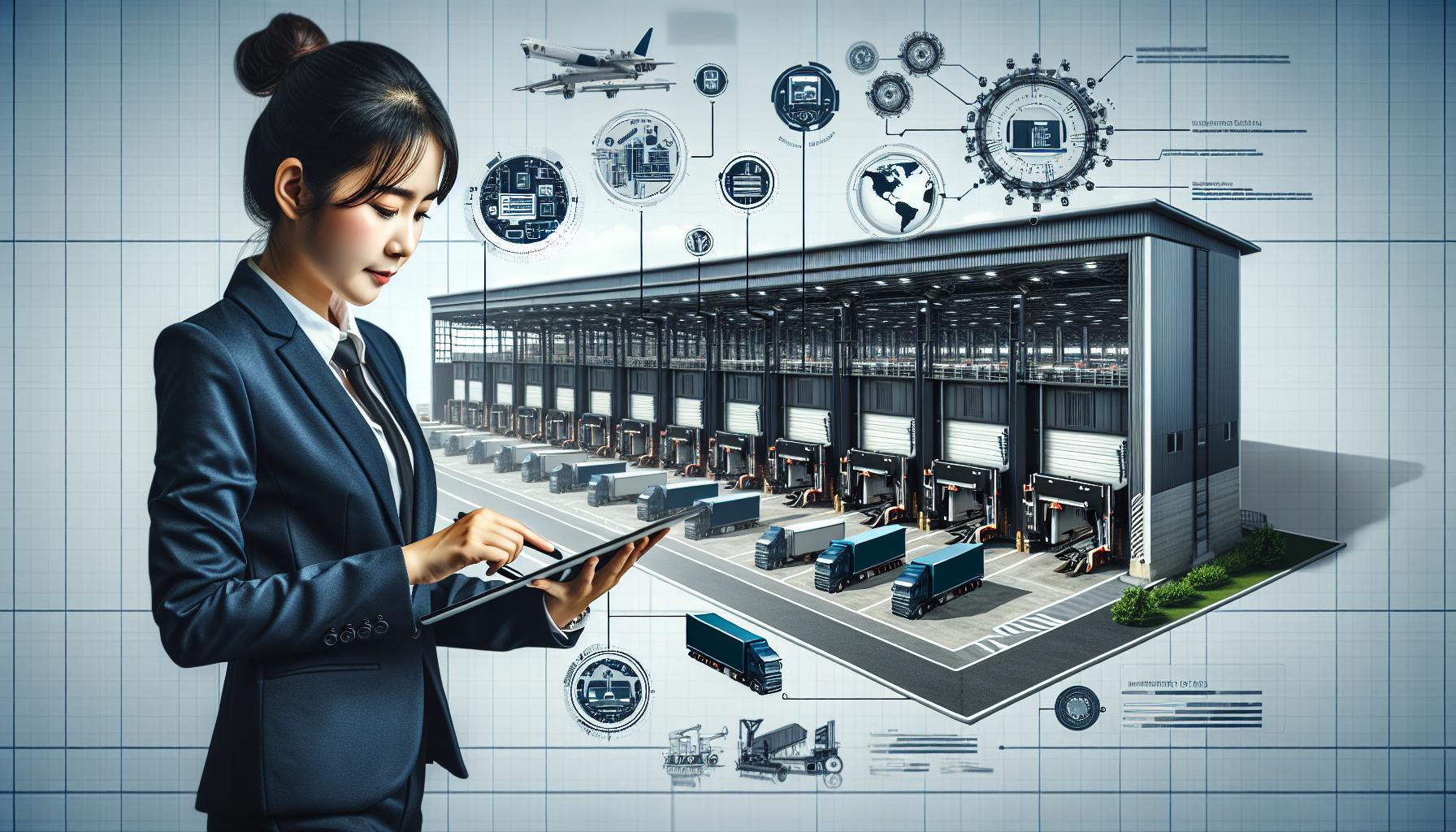Key Takeaways
- Industrial property management focuses on efficiency, tenant satisfaction, and long-term value, requiring a combination of operational expertise and strategic planning.
- Key responsibilities include lease management, regular maintenance, financial oversight, and building strong tenant relationships to ensure smooth property operations.
- Leveraging technology, such as facility management software, streamlines tasks like maintenance tracking, energy monitoring, and lease management, boosting operational efficiency.
- Compliance with safety, building, and environmental regulations is crucial to avoid legal risks, maintain tenant safety, and enhance property sustainability.
- Proactive maintenance, balanced cost management, and thoughtful upgrades, such as energy-efficient systems, enhance asset value and reduce long-term expenses.
- Strong communication and collaboration with tenants foster trust, improve satisfaction, and increase lease renewals, contributing to long-term profitability.
Managing industrial properties brings its own set of challenges and opportunities. From maintaining large facilities to coordinating tenant needs, it’s a complex process that requires careful planning and attention to detail. Have you ever wondered what it takes to keep these properties running smoothly while maximizing their potential?
I’ve found that successful management isn’t just about keeping things operational; it’s about creating value and fostering long-term growth. Whether you’re dealing with warehouses, manufacturing plants, or distribution centers, understanding the key aspects of effective management can make all the difference. What strategies can help streamline operations and boost efficiency? Let’s explore how to approach this critical task with confidence and clarity.
What Is Industrial Property Management?
Industrial property management involves overseeing the operation, maintenance, and leasing of industrial facilities, such as warehouses, manufacturing plants, and distribution centers. It focuses on increasing property efficiency, maintaining asset value, and maximizing tenant satisfaction.
I look at this field as a combination of operational expertise and strategic planning. Effective management includes scheduling regular maintenance, ensuring compliance with safety regulations, and negotiating lease agreements. Each task directly impacts the property’s functionality and long-term profitability.
Key responsibilities often cover tenant relations, building maintenance, budgeting, and financial reporting. For example, maintaining open communication channels with tenants helps identify needs early, while proactive maintenance prevents costly repairs.
Technology plays a significant role in streamlining processes and maintaining property data. Tools like facility management software allow for tracking maintenance schedules, lease expirations, and energy usage. How are you leveraging technology to address daily challenges?
This field also requires balancing operational goals with sustainability. Resource-efficient practices, such as energy audits or waste reduction programs, are becoming standard expectations in industrial properties. Would incorporating sustainable practices appeal to your tenants or reduce operating costs?
Key Responsibilities Of Industrial Property Managers

Managing industrial properties involves multifaceted duties aimed at maintaining functionality, increasing value, and fostering strong tenant relationships. Each responsibility contributes to the smooth operation and profitability of the property.
Lease Management
An essential aspect involves supervising lease agreements. I monitor lease renewals, evaluate rental rates, and address any changes in tenancy terms. For instance, I review contract clauses to confirm they align with legal compliance and tenant needs. Do you find managing multiple leases a challenge? Clear, organized records combined with effective communication can simplify this process.
Maintenance And Repairs
Maintaining safe, operational facilities is a priority. I schedule regular inspections and quick responses to repair requests for building systems like HVAC or structural components. This could include arranging preventive maintenance to avoid costly breakdowns. Could regularly assessing maintenance needs help you minimize long-term repair costs?
Financial Oversight
Managing financial aspects helps maintain property profitability. I prepare budgets, analyze operational expenses, and create detailed financial reports for stakeholders. Tracking income, including rent payments, ensures steady cash flow. How do you streamline financial reviews for large-scale operations?
Tenant Relations
Cultivating positive tenant relationships enhances satisfaction and minimizes turnover. I address tenant concerns promptly, resolve disputes, and maintain open communication. For example, setting up feedback channels can identify improvement areas. What steps could strengthen trust between management and tenants?
Importance Of Industrial Property Management

Industrial property management plays a critical role in maintaining property efficiency, tenant satisfaction, and long-term value. Effective management practices directly influence a property’s operational success and market competitiveness.
Boosting Asset Value
Enhancing the value of industrial properties centers on consistent upkeep and strategic improvements. Routine maintenance, like HVAC system servicing and structural inspections, prevents costly repairs and preserves property functionality. Thoughtful upgrades, such as energy-efficient lighting or advanced security systems, improve overall appeal and attract quality tenants. How often do you evaluate opportunities to upgrade your facilities?
Clear lease terms, combined with market-aligned rental pricing, also contribute to value enhancement. These strategies secure reliable income streams and protect the property’s market standing.
Ensuring Compliance With Regulations
Regulatory compliance safeguards tenant safety and legal standing. Oversight includes adhering to health and safety laws, local building codes, and environmental regulations. Regular audits and inspections minimize risks and ensure facilities meet current standards.
Staying informed of regulatory changes is vital in managing industrial properties. How do you keep up with local and federal policy updates? Tools like compliance management software simplify tracking legal requirements and deadlines, reducing potential liabilities.
Maximizing Operational Efficiency
Operational efficiency reduces costs while maintaining service quality. Streamlined processes, such as automating preventive maintenance tasks and using property management software, save time and resources. Could your operations benefit from automation?
Efficient energy use further enhances cost-effectiveness. Implementing smart technologies to monitor energy consumption helps identify waste and improve sustainability. Open communication with tenants about shared goals, like reducing utility costs, creates a collaborative environment for success.
Challenges In Industrial Property Management

Managing industrial properties comes with several challenges that demand attention and strategic problem-solving. Addressing these effectively can determine operational success and tenant satisfaction.
Managing Complex Tenant Needs
Meeting tenant requirements often involves juggling varied expectations. Some tenants might prioritize large storage spaces, while others focus on advanced facilities or reduced energy costs. How do you balance these differing priorities while maintaining operational efficiency? Communication is key. I always focus on understanding each tenant’s business model and challenges to create solutions that align with their operations. For instance, offering flexible lease terms or modifying spaces to meet specific workflows can go a long way in fostering trust and satisfaction.
Unexpected tenant requests can also arise. Proactively managing these requires consistent engagement and dependable support to resolve issues swiftly. This approach builds lasting relationships, reducing turnovers.
Navigating Regulatory Requirements
Operating industrial properties means staying compliant with multiple regulations. These govern safety standards, building codes, and environmental practices. Are you staying current on regulatory updates to avoid costly fines or litigation? Regular audits and inspections are essential for identifying and addressing compliance gaps. I rely on a thorough review process for regulations specific to HVAC systems, hazardous material management, and accessibility standards.
In regions with strict environmental rules, focusing on energy-efficient systems or water conservation can be beneficial. Implementing these upgrades can enhance compliance while appealing to tenants who prioritize sustainability.
Balancing Costs And Revenue
Striking the right balance between operational costs and revenue generation often feels like a tightrope walk. Repairs and upgrades can be expensive, but postponing them could result in higher maintenance costs later. How do you identify opportunities for cost-effective enhancements without compromising on quality? I adopt a data-driven approach by analyzing maintenance records and energy usage to prioritize investments that provide measurable returns.
Additionally, rental pricing structures need careful consideration. Charging rates that reflect current market trends, property amenities, and location helps optimize returns without alienating tenants. Building rapport with occupants by acknowledging their concerns about rising costs can also foster goodwill and improve long-term engagement.
Best Practices For Effective Industrial Property Management

Effective industrial property management involves strategies that improve efficiency, maintain value, and meet tenant needs. What steps can managers take to organize operations while addressing maintenance, tenant relationships, and technology integration?
Implementing Technology Solutions
Technology improves property oversight by streamlining processes. Facility management software simplifies tasks like tracking maintenance schedules, monitoring energy use, and managing lease agreements. Digital tools centralize key data, reducing manual errors and saving time. Have you explored automation features for contracts or energy reporting to boost operational control?
Cloud-based platforms enhance accessibility for teams working across multiple sites. Data-driven insights from analytics tools help predict repair needs and optimize energy consumption. Technology also supports sustainable initiatives; systems tracking utility use can uncover opportunities for reducing costs and carbon footprints.
Regular Inspections And Maintenance
Routine inspections address wear and tear, ensuring facilities remain functional for tenants. Maintenance schedules prevent small issues from escalating into disruptions. How would an unexpected repair affect your tenant satisfaction or operational costs?
Inspections identify potential hazards, maintaining compliance with safety regulations. Preventive maintenance programs, focused on systems like HVAC, plumbing, and electrical infrastructure, reduce downtime over time. Partnering with experienced contractors may strengthen response times during critical repairs.
Building Strong Relationships With Tenants
Strong tenant relationships foster trust and satisfaction, reducing turnover. Open communication helps managers address tenant concerns and align expectations. How often do you check in with tenants to review their feedback or needs?
Quick response to inquiries or repairs shows attentiveness. Transparent lease agreements clarify terms, preventing disputes. Proactive engagement, such as updating tenants on property upgrades, promotes collaboration. These efforts create a positive environment where tenants feel valued and likely to renew their leases, boosting long-term retention.
Conclusion
Industrial property management is a dynamic field that requires a blend of strategic planning, operational efficiency, and tenant-focused practices. By leveraging technology, maintaining strong tenant relationships, and prioritizing sustainability, property managers can optimize performance and create lasting value.
Success in this field depends on staying proactive, ensuring compliance, and continuously seeking ways to improve processes. With the right approach, industrial properties can thrive as efficient, profitable, and tenant-friendly spaces.
Frequently Asked Questions
What is industrial property management?
Industrial property management involves overseeing the operation, maintenance, and leasing of facilities such as warehouses and manufacturing plants. Its primary goals are to increase property efficiency, maintain asset value, and ensure tenant satisfaction while complying with safety regulations.
Why is regular maintenance important for industrial properties?
Regular maintenance prevents disruptions, ensures tenant safety, and maintains compliance with safety regulations. It also helps preserve the property’s value and prevents costly repairs by addressing issues early.
How can technology improve industrial property management?
Technology, such as facility management software, streamlines operations by tracking maintenance schedules, energy usage, and lease agreements. It enhances efficiency, reduces operating costs, and simplifies compliance with safety and environmental standards.
What are the key responsibilities of an industrial property manager?
An industrial property manager handles lease management, building maintenance, financial oversight, compliance, and tenant relations. Their role is crucial in maintaining property efficiency, tenant satisfaction, and long-term value.
How can industrial property managers improve tenant relations?
Strong tenant relationships can be cultivated through open communication, quick responses to inquiries, proactive engagement, and addressing tenant needs. This approach reduces turnover and fosters long-term tenant satisfaction.
What role does sustainability play in industrial property management?
Sustainability is increasingly important as resource-efficient practices appeal to tenants and reduce operational costs. Implementing energy-saving technologies and green initiatives helps enhance property efficiency and market competitiveness.
Why is compliance important in industrial property management?
Compliance with safety, local building codes, and environmental regulations ensures tenant safety, mitigates legal risks, and maintains the property’s legal standing.
How can property value be enhanced in industrial property management?
Consistent upkeep, timely maintenance, and strategic upgrades improve property efficiency and appeal. This enhances property value, market competitiveness, and tenant satisfaction.
What are some best practices for effective industrial property management?
Best practices include implementing technology solutions, conducting regular inspections, maintaining tenant communication, ensuring compliance, and prioritizing sustainability. These practices streamline operations and reduce long-term costs.
How can industrial property managers maximize efficiency?
Managers can maximize efficiency by using technology, optimizing energy usage, scheduling regular maintenance, and implementing streamlined processes. These strategies minimize disruptions and enhance operations.
